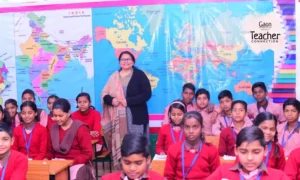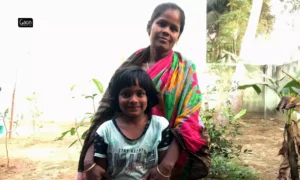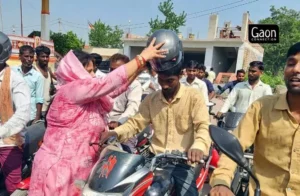It was in school, one afternoon, when Anjali Vaishnav felt some discomfort in her abdomen. She found she had bled and stained her skirt. She was asked to go home immediately. Before that she was handed a sanitary pad, which she had no idea how to use.
“I cried. I covered the stained area with my school bag and went home,” Anjali, described her “worst day” at school to Gaon Connection.
“It was like I was living a bad dream,” the 18-year-old, from Barwas village in Tonk district, Rajasthan recalled.
Anjali is just one of almost every other girl in the rural parts of the country who was caught unawares and distraught when she had her first period.
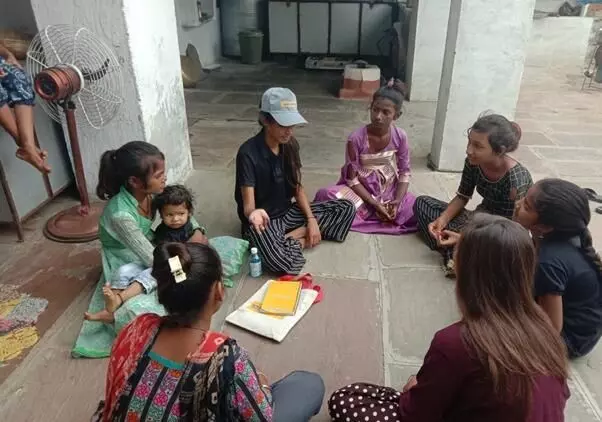
Kishor Mitra sharing adolescent health related knowledge with her peers.
It does not just end with physical discomfort. There were other things menstruating girls had to face. While they menstruated, the girls were forbidden to enter the kitchen, religious places of worship and also be kept isolated for those three days or so.
These taboos still prevail.
“I did not know why this was happening to me. When I asked my parents, they got angry and told me I was impure,” Nisha Choudhary from Darda Hind told Gaon Connection.
For years, Nisha continued to use unsanitary rags unaware of sanitary pads. This, despite her father working in the field of medicine. Neither her family nor healthcare workers had cared to make her aware of the changes in her body and what she needed to deal with them.
Also Watch
Stories of change: An army of 10,000 adolescents
Years on, Anjali and Nisha, driven by their own experiences with menstruation became part of a movement, showed the way to other adolescent girls in the villages of Rajasthan and spoke openly about hitherto unmentionable topics such as menstruation, puberty, adolescent and sexual health. There are over 10,000 youth leaders like Anjali and Nisha who are overcoming menstrual hygiene struggles and taboos in rural Rajasthan.
Since October 2018, Population Foundation of India (PFI) has been running a programme called Feminist Adolescent and Youth-Led Action (FAYA) in four districts of the state — Bundi, Karauli, Dungarpur, and Tonk. FAYA conducts out-of-school sessions on comprehensive sexuality education for adolescents.
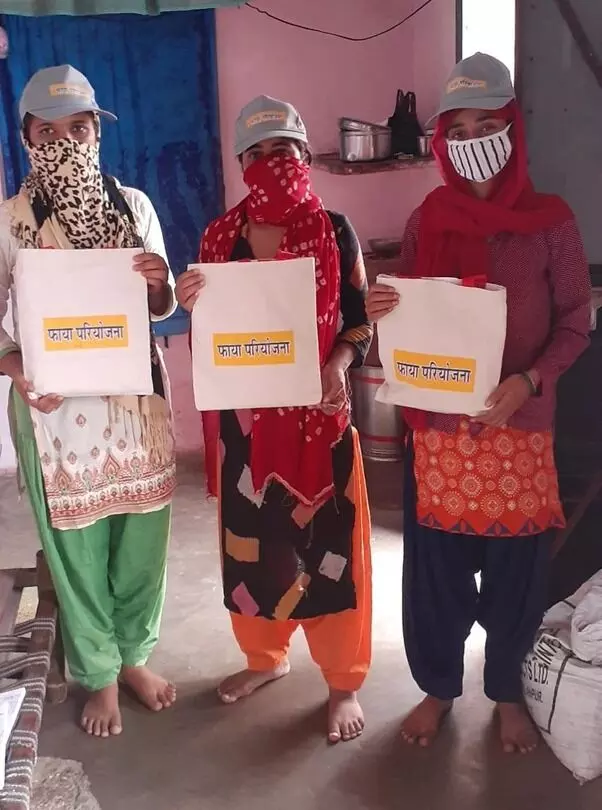
Kishor Mitra holding a resource kit to support them in conducting peer sessions.
Under this programme, the non-profit PFI trains adolescents in rural areas to build their agency and advocate for access to services and rights with peers and family members, communities and state and national level policy makers and implementers.
“The adolescent age group remains neglected. To make adolescent reproductive health a priority, we have been working at two levels — policy level and citizen engagement at state level,” Priyamvada Singh, associate lead and state head of PFI, Rajasthan, explained to Gaon Connection.
“We have seen a visible improvement. Those who once considered it to be a topic of secrecy and shame, now openly discuss menstruation and reproductive health,” Singh said. For instance, they took a rally out in Tonk district during the pandemic to raise voice on the shortage of supply of sanitary napkins before the district collector.
The army of the 10,000 adolescents, both girls and boys, calling themselves Kishore Mitras also reached out to 20,000 other adolescents in villages. In all, over 30,000 adolescents across 200 villages in Bundi, Karauli, Dungarpur and Tonk districts are being sensitised and made aware of reproductive health and related matters.
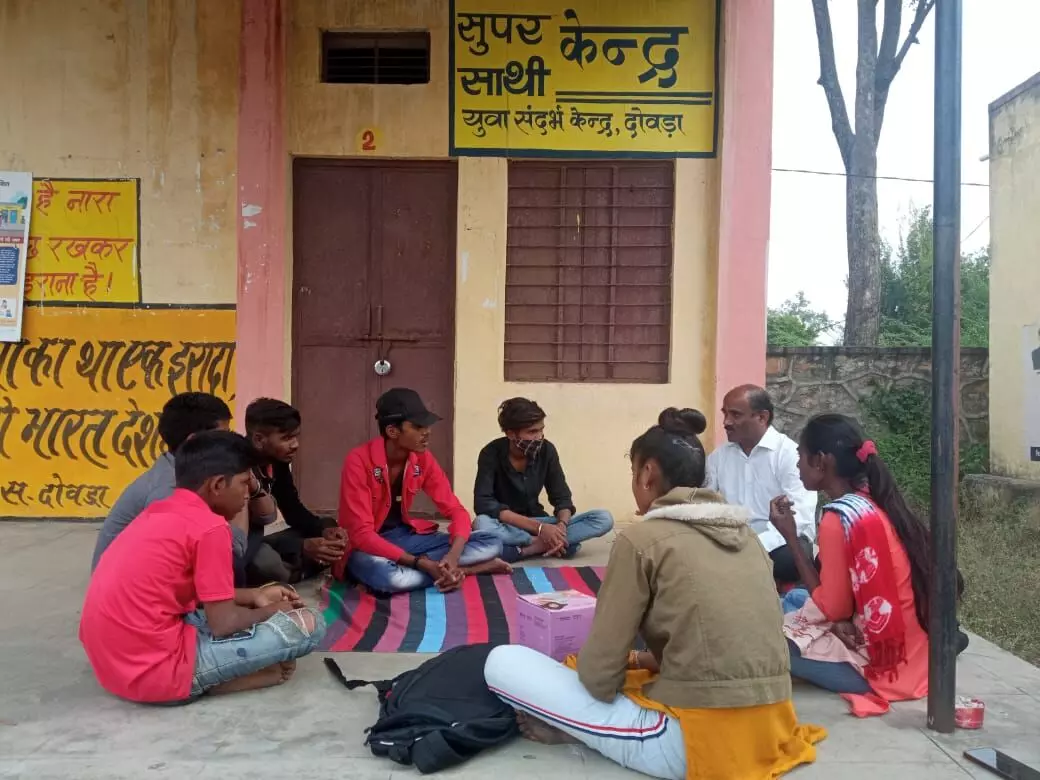
The adolescents, both rural girls and boys, are being sensitised and made aware of reproductive health and related matters.
Also Read: ‘Chuppi Todo Baithak’: A Story from Sundarbans
Nisha and Anjali lead weekly sessions on menstrual hygiene, taking pride.
“We inform our peers about menstruation, sexual health and reproduction. We speak of the physical changes in a girl’s body that occur between ages 11 and 18; what leads to these changes and how use of sanitary pads, and maintenance of hygiene are important,” said Nisha. The youth leaders also speak of the right way to wash period clothes well and dry them in the sunlight before reusing them, she added.
“Earlier, very few girls would join such sessions but now the numbers are increasing. After these sessions, many girls start using sanitary pads and have raised their voice to remove restrictions on them,” she added.
For this volunteer work, Kishore Mitras are given a diary, a pen, a backpack, and a water bottle as a token of acknowledgment of their hard work and identity.
Dedicated clinics for adolescent health
Adolescents in the age group 10 to 19 years constitute 23 per cent of the total population in Rajasthan, according to the National Health Mission.
Under the Rashtriya Kishor Swasthya Karyakram (RKSK), the state government aims to promote health of adolescents for inclusive growth through: peer educators, menstrual hygiene schemes, quarterly adolescent health days, iron folic acid supplementation, and adolescent friendly health clinics.
“Initially, the scheme was only functional in ten districts of the state, but later all twenty four districts were included and adolescent friendly health clinics were expanded and set up in every district of the state at two hundred community health centres (CHC) to provide a dedicated space for adolescent counselling. We were able to achieve this last September in collaboration with the state health department,” said Priyamvada.
According to her, a fund of two crore rupees (Rs 20 million) per CHC was sanctioned by the local MLA fund under the Chief Minister Ashok Gehlot’s direction. “Training of two hundred medical officers in capacity building was also facilitated as just setting up such clinics was not enough. We are trying to increase the footfall in such clinics,” she added.
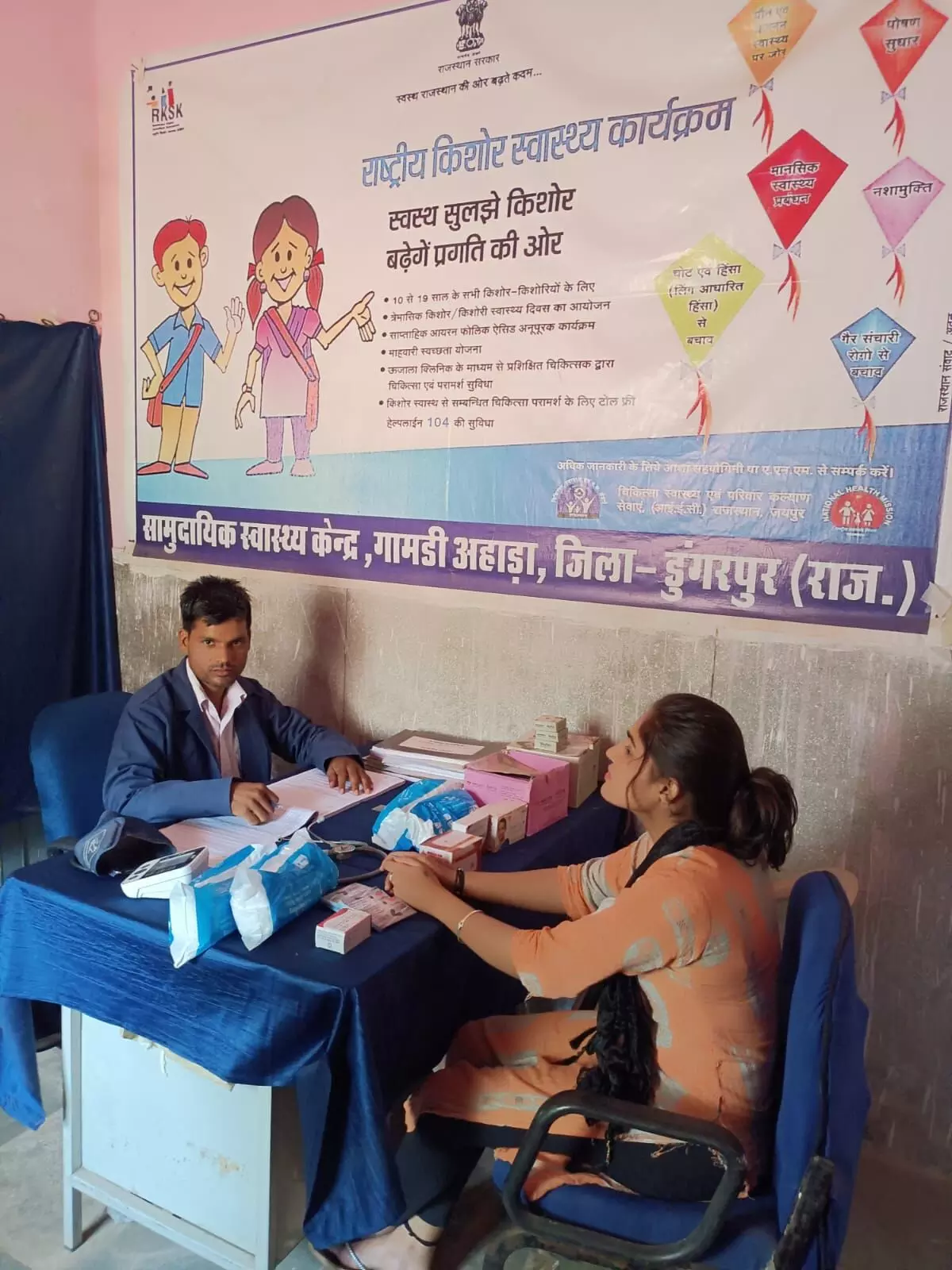
Weekly sessions at these healthcare centres are organised post OPD hours for two hours.
The key ‘friendly’ component of the Adolescent Friendly Health Clinic (AFHC) mandates facility-based clinical and counselling services for adolescents, who can go to such clinics without hesitation and bring about a positive change in the status of adolescent health.
“These clinics have an inviting place for adolescents, IEC (Information, Education and Communication) material such as leaflets and posters on menstruation, good diet, rest during periods, and hygiene practices. In addition, these clinics also have weight and height machines, and commodities required during menstruation,” Mamta Chauhan, faculty of the State Institute of Health and Family Welfare, Government of Rajasthan told Gaon Connection.
Chauhan has coordinated the training of 200 medical officers for AFHC between May and June this year.
“Weekly sessions at these healthcare centres are organised post OPD hours for two hours. Apart from medical officers, we have also trained ANM [Auxiliary Nurse Midwife] and staff nurses. There is a plan to scale up AFHC coverage across thirty three health districts of Rajasthan,” said the official. Chauhan is also a national trainer of the Rashtriya Kishor Swasthya Karyakram programme.
These clinics offer clinical and counselling services on diverse adolescent health issues such as sexual and reproductive health, nutrition, substance abuse, gender based violence, non communicable diseases and mental health.
Also Watch
According to the National Family Health Survey (NFHS-5), 72 per cent rural women aged 15-24 years use hygienic methods of protection during their menstrual period in the country. While the figure stands less than the national average in states such as Assam, Bihar, Chhattisgarh, Jharkhand, Meghalaya, Gujarat, Madhya Pradesh, rural Rajasthan has 81.9 per cent of women in the same age bracket who use hygienic methods of protection during their menstrual period.
Between 2015-16 and 2019-21, this percentage has improved from 47.9 per cent to 81.9 per cent in rural Rajasthan.
“The state government has been running several programmes, including distribution of free sanitary napkins to all girls and women. Along with this, in rural areas, there is increased awareness through literacy, media presence, and advertisements of government initiatives through the radio,” Chauhan said.
Also Watch
However, she acknowledged that there were still some bumps and challenges. According to her, in several government schools male teachers were reluctant to distribute sanitary napkins to the girl students.
“We also have to focus on the right and safe disposal of sanitary napkins. Currently, they are incinerated or dumped. We have to do evidence-based advocacy to promote use of menstrual cups to curb use of sanitary pads as lots of biomedical waste is generated,” pointed out the state official.
Meanwhile, Anjali, who is pursuing studies in medicine, wishes to become a gynaecologist. “I will never let what happened to me when I first got my periods, happen to my future daughter,” she declared.







